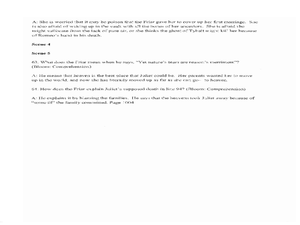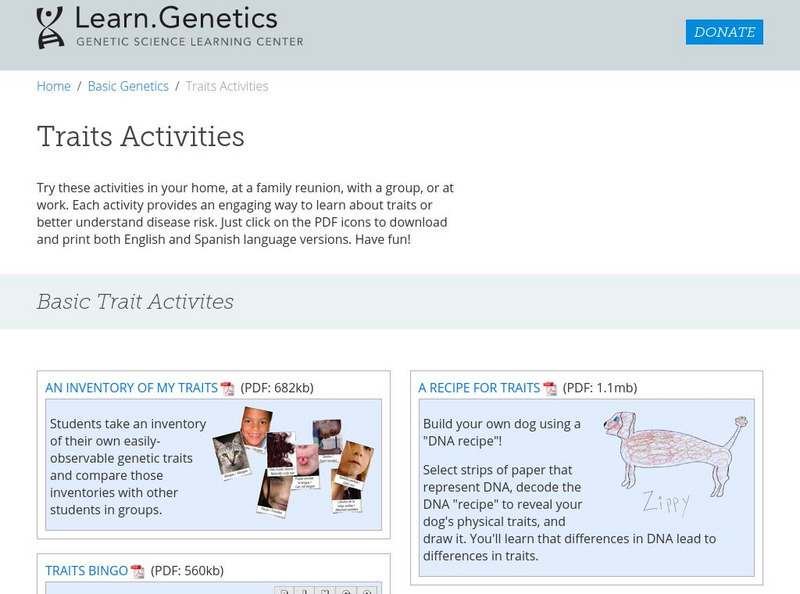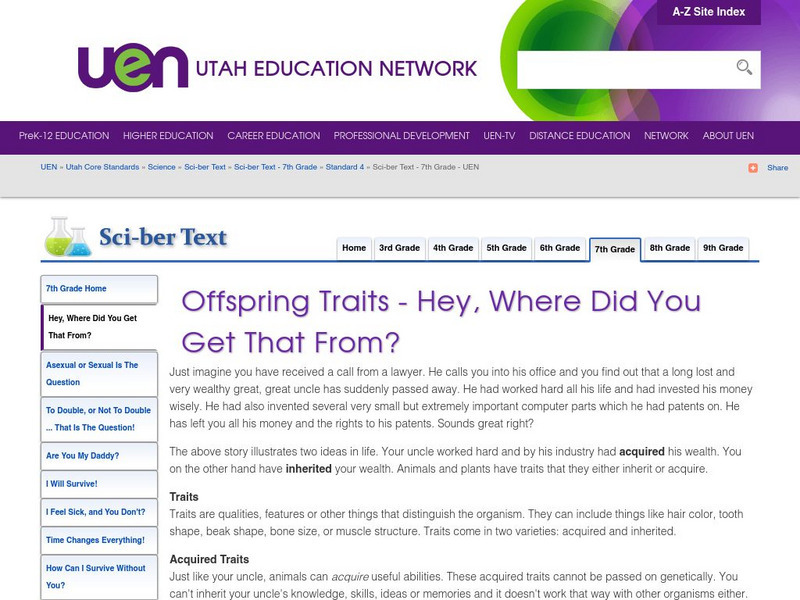Curated OER
Boys Will Be Boys...Right?
Through this exercise, high schoolers identify character traits present in Romeo and Juliet. They listen to an excerpt from "The Office of Christian Parents: Showing How Children Are to be Governed" and participate in a Socratic...
Curated OER
Inquiring Minds Want To Know
Eighth graders conduct a scientific experiment that help them explain the concept of nature versus nurture.
Curated OER
Twin Traits
Eighth graders explore the Nature vs. Nurture controversy and discover how variations in species is due to the interaction of genetic material. Students engage in a twin study experiment in this unit.
Massachusetts Institute of Technology
Mit: Open Course Ware: Introduction to Psychology
This course surveys questions about human behavior and mental life ranging from how you see to why you fall in love. The great controversies: nature and nurture, free will, consciousness, human differences, self and society. Students are...
University of Utah
University of Utah: Genetic Science Learning Center: Traits Activities
A collection of genetic learning activities provides an engaging way to learn about traits, or better understand disease risk.
PBS
Pbs Learning Media: Nature Versus Nurture Revisited
Which dictates our existence? Is it our genetic makeup or the environment we grow up in? Kevin Davies offers an update on this long-standing debate, from the NOVA: "Cracking the Code of Life" Web site.
Diffen
Diffen: Philosophy: Nature vs. Nurture
An article addressing the differences between the two philosophies of psychology, nature and nurture. Find examples of the two approaches, a TED Talk, discussion on the morality of both as well as the philosophy behind them.
American Museum of Natural History
American Museum of Natural History: Nature Versus Nurture O Logy Card
Flip this interactive OLogy card to find questions and answers, fast facts, and other bite-size pieces of information to help you understand the nature-versus-nurture debate.
Other
Verywell: What Is Nature Versus Nurture?
An article featuring the ongoing philosophical debate over psychology's nature versus nurture. Cherry clarifies the differences between the two schools of thought and provides the changes in theory over the years.
Lumen Learning
Lumen: Boundless Psychology: Nature vs. Nurture
Study what roles genetics and the environment play in human behavioral development. This is a learning module which includes the reading assignment, a quiz, and PowerPoint program.
CommonLit
Common Lit: "The Nature vs. Nurture Debate" by Common Lit Staff
A learning module that begins with "The Nature vs. Nurture Debate," accompanied by guided reading questions, assessment questions, and discussion questions. The text can be printed as a PDF or assigned online through free teacher and...
Other
Buzzle.com: Historyplex: Examples That Simplify Meaning of Cultural Determinism
Explains what is meant by cultural determinism and the role anthropologist Franz Boas played in developing the concept, and provides examples of culture influencing human behavior.
CommonLit
Common Lit: "How Do I Look?" by Bird Brain Science
A learning module that begins with "How Do I Look?" by BirdBrain Science, accompanied by guided reading questions, assessment questions, and discussion questions. The text can be printed as a PDF or assigned online through free teacher...
American Museum of Natural History
American Museum of Natural History: A Nature and Nurture Walk in Mendel Park
Take a walk in the animated "Mendel Park" to discover which traits are genetic and which are a combination of genetics and upbringing.
PBS
Pbs: Our Genes, Our Choices
Student teams research human behavior and explore whether traits are inherited only by genetic inheritance or if environmental factors can play a role as well.
Other
Simply Psychology: Saul Mc Leod: Nature vs. Nurture in Psychology
There are five approaches to psychology which are on a spectrum from nature versus nurture. The approaches with inherited traits lean towards the nature end and those with acquired traits are on the nurture end. This article helps...
CommonLit
Common Lit: Text Sets: Science of the Body
Introduce students to how the body looks and works with these texts on biology and genetics. This collection includes 20 Grade-Leveled texts (5-10) on the topic of Science of the Body. [Free account registration required for specific...
CommonLit
Common Lit: Book Pairings: "Jacob Have I Loved" by Katherine Paterson
In this novel, Louise dreams of leaving her tiny island home in Chesapeake Bay, but first she must escape the shadow of her twin sister who seems to rob her of everything. Selected (11) reading passages (grades 6-10) to pair with "Jacob...
Utah Education Network
Uen: Offspring Traits Hey, Where Did You Get That From?
Can you distinguish traits that are acquired from those which are inherited? Answer these online questions and find out.
Sophia Learning
Sophia: Nature vs. Nurture
This lesson will identify nature and nurture as debated causes for behavior and personality.
Sophia Learning
Sophia: Nature vs. Nurture
This lesson will look at how to recognize key factors of the nature vs. nurture debate in psychology.
Other
Nurture Is Not the Same as Environment
Excerpt from book by Judith Harris which argues that parents do not have as much influence as peers in child development.















